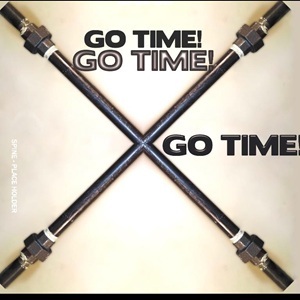
In an age where digital perfection and auto-tuned vocal tracks dominate mainstream rock, Go Time!’s X stands out as a testament to raw, analog authenticity. The band, a Chicago institution fronted by Scott Niekelski (vocals, guitar, keyboards), supported by Steve Grzenia on drums and backing vocals, Paul Schmidt’s incisive guitar work, and Mark Marketti’s steadfast bass lines, delivers an album that challenges the sanitized soundscapes of modern rock with a deliberate, unprocessed energy.
The opening salvo, “Cost Time Commitment,” sets the tone with choppy, aggressive guitar riffs that immediately evoke the spirit of classic rock recordings from the analog era. The production is refreshingly unpolished, capturing the kind of live energy that’s often lost in today’s overproduced tracks. Niekelski’s vocals, gritty and passionate, cut through the mix without the aid of modern pitch-correction, offering a raw delivery that harks back to a time when emotion was conveyed with every unrefined note.
Following this, “What I Needed” shifts gears to blend introspection with playfulness. Here, an unexpected kazoo interlude interweaves with intricate percussion patterns, challenging the listener’s expectations while underscoring the band’s willingness to experiment within the rock framework. This track is a clear departure from the cookie-cutter formulas prevalent in current mainstream rock, where repetitive loops and digital effects often substitute for creative spontaneity.
https://open.spotify.com/album/6XmSWdoO9ExtAHgRY4FrIo
As the album progresses, tracks like “Turning Tides” and “Complicated Truth” exemplify Go Time!’s commitment to precision and emotion. “Turning Tides,” a brisk, two-minute composition, is meticulously arranged. Paul Schmidt’s precise guitar runs and Mark Marketti’s propulsive bass work create a dynamic backdrop that is both relentless and carefully crafted. Steve Grzenia’s drumming on this track is particularly noteworthy; his use of crisp, unquantized beats brings an organic feel that starkly contrasts with the digitally sequenced rhythms found in much of today’s rock radio.
Beyond the instrumentation, the lyrical content of X speaks to the band’s storied past and their defiant stance against modern homogenization. Niekelski’s lyrics, delivered without frills, touch on themes of personal hardship and the enduring nature of rock. In songs like “Damaged Goods” and “Discarded Receipts,” listeners are offered a narrative steeped in the trials of long-term touring and personal loss—elements that lend the album a gravitas missing from the often superficial musings of contemporary pop-rock.
Go Time! has never been a band to chase trends. Their evolution from a raw, basement act to a stalwart of the Chicago music scene is embedded in every note of X. The band’s history, marked by resilience through health challenges and relentless touring schedules, resonates in the album’s unfiltered production. Unlike many modern acts that rely heavily on digital manipulation to achieve commercial appeal, Go Time! embraces an analog approach that is both a tribute to rock’s roots and a critique of today’s digital age.
In an industry where the mainstream often favors mass appeal over genuine artistry, X is a clarion call for a return to the fundamentals of rock. It is an album that refuses to be compartmentalized by the current trends of overproduction and synthetic sound, instead offering a collection of songs that are as much about the visceral experience of live performance as they are about personal expression. For those disillusioned by the ephemeral nature of modern rock, X is a reminder that raw, authentic music still holds the power to captivate and inspire.
Gwen Waggoner
